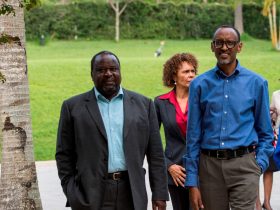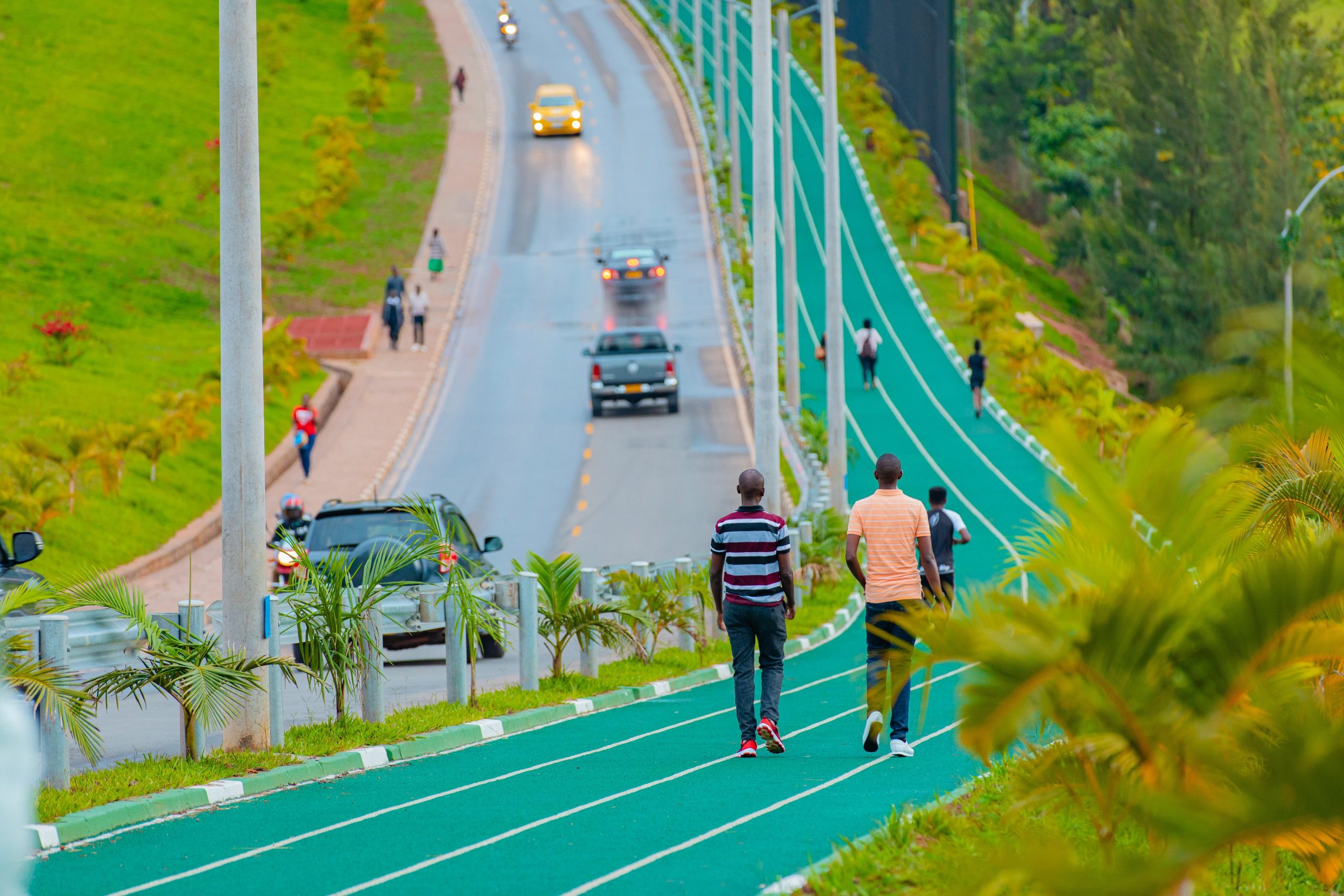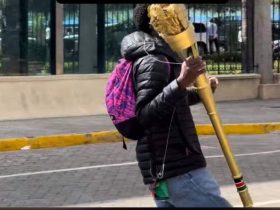One of the reasons genocide ideology, racism or anti-semitism persist, is because Western media keeps finding new ways to frame them as insight, freedom of expression, intellectualism, etc.
When Rwanda needed the world’s attention, three decades ago, the world’s response was indifference, at best. At the time, the Rwandan Patriotic Front, led by Paul Kagame asked the US and the UK to jam the signal of RTLM, a hate radio that was calling people on hills to kill Tutsi; “We cannot interfere with freedom of press”, they said.
Just under three decades later, the country that most predicted would be a failed state, now leads the continent in areas such as “ease of doing business”, attracting international conferences and world’s sports; The 2025 world road cycling championships will be held in Rwanda, a first in Africa.
To achieve that, only 29 years after a genocide that took the lives of over a million people, hasn’t been easy as anyone would imagine. Rwandans chose consensus politics that has seen genocide perpetrators tried in traditional courts, then pardoned after asking for forgiveness, survivors rehabilitated and the country reconciled, before embarking on a firm path towards development and social transformation.
However, the experience of 1994 has also taught Rwandans to tell their own story, which sadly threatens obsolescence to “African experts”, who first landed in Kigali right after the genocide with ready-made governance templates and purported to chart our future. We politely declined. Liberal democracy while effective in the West, had not worked in our poor, landlocked, densely populated country, with rife ethnic tensions introduced by Belgian colonialists and entertained by the first and the second republics.
So they gave three months to the post-genocide government to collapse, it didn’t. Then six months, and so on. While no one predicts the future, the fact is that Rwanda has experienced the longest stability in recent post-colonial history, and that, under the stewardship of Paul kagame. However if you read some articles in western media, you would be shocked by the dystopian depictions they reserve to a country where education, housing and healthcare are free for the poor, where life expectancy now reaches 70 years, almost at par with rich nations.
One of such declinist authors is Michaela Wrong. When her book on Rwanda came out, I wrote a rejoinder: Here. Almost nothing in it is factual. She makes claims she can’t substantiate, documents she can’t produce and refers to witnesses she can’t reveal – all for their safety of course…
Her recent article in Foreign Affairs is no exception. She claims that the FDLR, a militia led by those who fled after committing the genocide against the Tutsi, is a scapegoat for Kagame to invade and plunder the DRC. But the FDLR did in fact bomb the Rwandan territory in 2022 days before the Commonwealth Heads of States meeting (CHOGM) was to take place in Kigali, killing innocent civilians and destroying property. In 2019 they had attacked the same border town of Kinigi, northern Rwanda. The UN, which she quotes, has consistently reported that the Congolese army FARDC does collaborate with the FDLR, only that part is left out in typical deceit.
Second, she claims that the M23 rebel movement invaded the DRC from Rwanda. Only, it is geographically impossible to seize the town of Bunagana from Rwanda. Bunagana is located up north at the border with Uganda, and Ugandan officials have admitted that M23 came from their country, where they had been encamped for over 25 years, waiting for the DRC government to fulfill its commitment of repatriating their near 300 thousand refugee community, in vain.
It is remarkable that such reporting in the media is contradictory the position of the two regional mediators looking for a peaceful solution to the Eastern DRC conflict. Both Angola and Kenya who sent troops to the restive region do not intend to engage M23 militarily. M23’s demands are well understood in the region, mainly because Rwanda, Burundi, Uganda and Kenya have all been sheltering Congolese Tutsi who fled from FDLR genocide perpetrators.
It is reductive to overlook the plight of the Congolese Rwandophone community that has been rendered stateless for about three decades, because one has a bone to pick with Paul Kagame. As I write, the M23 has fulfilled its promises to cede its conquered territories to regional forces in exchange for a dialogue towards a peaceful return of their diaspora, as promised. But the DRC president has flipped again, saying he will never negotiate with the group.
“After M23 was defeated in November 2013, eastern Congo was relatively quiet for the next eight years”, Michaela Wrong writes. This is a lie. M23 isn’t even remotely violent compared to other groups operating in Eastern DRC, nor is it the source of the country’s instability. This week it was reported that there are over 250 militias operating in eastern DRC, of which Ugandan jihadists of ADF-Nalu, Rwanda’s FDLR, Burundi’s RED-Tabara and Congolese regular army – the FARDC are reported to commit most crimes against Congolese civilians.
Now, the reason I chose to briefly come out of retirement, is because Michaela Wrong claims in her recent article, that Tutsi are being targeted in DRC because of the M23’s resurgence. “Congolese Tutsis, she writes, are also victims of the M23’s new campaign.” She made the same accusations in her book, on page 369, that Tutsi brought death upon themselves.
This claim is dangerously familiar. The person who invented it was Gregoire Kayibanda, the first Rwandan president. In a speech in 1962, after killing Tutsi of Rukumberi, former Gikongoro, he warned Tutsis in exile canvassing to return home, that should they ever attack Rwanda, their relatives would be exterminated in retaliation. The said relatives had been dispossessed of their land and cattle, then deported from their villages of origin and sent to die in “Tutsistans”: arid, inhospitable regions replete with Tsétsé flies…
The same message was relayed on hate radio RTLM, by genocide cheerleaders such as Valerie Bemeriki – Michaela Wrong’s alter-ego, in preparation of, and during the genocide against the Tutsi between 1990 and 1994. “If the RPF doesn’t return to Uganda where they belong, the message said, Tutsi in Rwanda would be exterminated”.
Such remarks constitute incitement to genocide and Bemeriki is serving a life sentence in Rwandan prisons for genocide and crimes against humanity.
What of the 300 thousand Congolese Tutsi who have been in exile for the last three decades; what is their sin? What of the Tutsi congolese trapped within their own coutry who face daily stigma, brutality and at times killing by excited mobs, militias and the regular congolese army? “Rwandophones” are being targeted in Eastern DRC, in fact, because of genocide revisionists like Michaela Wrong, peddling accusation-in-mirror.
Following allegation of massacres of Kishishe, reported differently by the UN, the DRC government and various media networks, all without setting foot on the ground, colleagues and I travelled in the war zone in Eastern DRC to investigate. Populations in Kishishe told us that no massacre had occurred in their village. They said there were 21 people in total who were killed in a battle between a local Mai-Mai militia and M23.
In our report, here, we shared filmed testimonies; we shared names and occupation of the victims; names and contacts of interviewees, we showed the graves where the people had been buried, we even filmed a focused group discussion by the population of Kishishe on what had exactly occurred in their village.
The government had reported 300 victims, while the UN had said 151. In writing our report, we sent a questionnaire to the DRC government, the Rwandan government and the UN. Rwanda and the UN responded, the DRC did not.
Our question to the UN Mission in DRC (MONUSCO) was simple: Do you know the identity of people who died in Kishishe? Is there a report we can consult?
We were astonished with their response. They admitted to having no report on the matter and no knowledge of the victims; all they had was a one pager declaration to the press. Our findings were later corroborated by Human Rights Watch’s own investigation. Last week after M23 had vacated Kishishe, French television TV5 wanted to revive the “Kishishe massacres”. They filmed an old skull on a random village path, then recorded a mystery man with altered voice and a blurred face, claiming to be from Kishishe and alleging the existence of a mass grave. That is all! TV5 couldn’t show the mass grave because none exists in Kishishe!
Michaela Wrong is in the same league of forgers. As is her habit in every article, she resurrects the old accusations of the late 90s, that Rwanda invaded the DRC to plunder its minerals and conduct widespread massacres. Those accusations have been extensively debunked. As explained here by veteran politician Etienne Tshisekedi, father of the current DRC president Tshisekedi Jr., Then president Sese Seko Mobutu had refused to disarm genocide perpetrators and placed them in a camp near the Rwandan border, in violation of the 1951 Refugee Convention. As a result they frequently crossed into Rwanda and continued Killing Tutsi, which led the Rwandan Patriotic Army (RPA) to invade former Zaire.
However, in ‘La traversée’ a book by French author, Patrick de Saint-Exupéry, refutes the pervasive allegations of massacres conducted by the Rwandan army in Zaire. The war reporter journeyed from Kigali to Kinshasa, in the footsteps of the RPA and of Rwandan refugees, interviewing villagers and visiting alleged killing sites on his way, and found no sign of any massacres. De Saint-Exupery’s findings were recently confirmed by the “Duclert Report”, by a commission of French historians set-up by President Emmanuel Macron to examine the role of France in the Genocide Against the Tutsi.
There is no single allegation by Michaela Wrong that has not been spectacularly invalidated. In her book she accused the Rwandan government of strangling a former spy, one Karegeya in a posh hotel in downtown Johannesburg, South Africa. In reality, no nexus has ever been established between the Rwandan government and Karegeya’s murder, in one of the most dangerous cities on earth. While a lawsuit was filed by his family in South African courts to that end, a South African judge decided to strike the case from the role, citing lack of evidence.
When it comes to Rwanda, researchers in any other fields update their datasets annually, because the country’s transformation happens live, for everyone to see. The moniker: “impoverished donor-dependent, authoritarian regime”, is outdated and could not be further from reality in today’s Rwanda. Perhaps it is because the likes of Michaela Wrong have been banned from entering Rwanda since a long time that they revert to repeating outdated mantras.
Last week it was reported that Rwanda has created over 1000 multi-millionaires in dollars, with 72 new entrants on the list last year alone. With limited corruption and little natural resources, this data vindicates Kagame’s politics. This also means that taxes were adequately collected on this wealth, and social services will be adequately funded. It also means lasting stability as people with millions of dollars do not typically wish for war in the place where they have invested their money.
There is a reason Rwanda leads the continent, not as the place with the most millionaires, but as the country that adds more millionaires annually. 29 years after the genocide, a landlocked country with little natural resources, adds 7.2% millionaires annually. Rwanda also has a couple of billionaires in coffee, tea, hotels and banking. Imagine that! That’s the best places to have billionaires: unlike mining and politics, these are labor intensive sectors, creating good jobs and social security! A good economy!
Perhaps Wrong’s biggest rejoinder yet, are reports by the World Bank and the World Economic Forum that Rwanda leads the continent in attracting and retaining the best and brightest in the last ten years; mostly Rwandans, but also foreigners. These people whom for the most part leave western capitals to settle in Rwanda seem to see no problem with its alleged dictatorship and lack of freedoms.
If she claims that Paul Kagame is a “darling of the West”, a bizarre attribute for a politician, usually in the realm of affection, if she also claims that he longs for relevance, she should at least acknowledge that he is highly regarded on his own continent.
The man she calls a ruthless dictator, was unanimously elected by his peers to reform the African Union, whence he pushed for a Continental Free Trade Area agreement. As I write, Paul Kagame is on a tour of West Africa. In Guinea-Bissau he was bestowed the “Amilcar Cabral medal”, the highest distinction of the land and a befitting tribute, from a freedom fighter to another. In Guinea-Conakry, a highway was named after him, and in Benin he promised to send Rwandan troops to secure its northern region, as they do in Mozambique, in Central African Republic and across the continent. When he went to inspect the guard of honor, Bissau-Guinean republican guards intoned a Rwanda Defence Force morale song in Kinyarwanda, as it turns out, they all were trained in the Rwandan Military academy…













THANKS to Gatete!
This article is full of wisdom & clarifications needed on real Rwanda.
Glad you have not retired as you threatened – keep us informed.
Absolument clairvoyant et fort bien articulé ! Les faits sont têtus et les faits historiques encore plus, du béton ! Toutes les âneries des Wrong et les manipulations des Onana et leurs sombres sponsors n’y changeront, rien …NADA!
This is an excellent response to Ms. Wrong!
Gatete,you are doing proud all the Rwandans by debunking the wrongs on Rwanda by Ms Wrong.Keep it up dear conpatriot.
This is wise and good effort.Aluta continua.
Thanks Mr Gatete
To this factual article I just wish that those who read Michela Wrong is poison can read this article as well.
They could get true picture from Rwanda and her remarkable leadership.
Thanks once again.
Excellent article Mr. Gatete! Welldone.
Well done Gatete!
You have put clear facts to the light. Ms. Wrong is another hater who looks to tarnish the success and commendable leadership of Rwanda.
I hope those reading her book can do further research to know more about Rwanda and her leadership not just to believe on unfounded facts that not only are false but also instigates hatred and divisions.
Rwanda moves on!
God bless Rwanda and HE PK.
Well put Gatete, we move on clockwise!
Say No more to retirement, we still need your bright articles Gatete
Michela Wrong is not only wrong, she was born wrong.
She and some companions have been at work for almost three decade’s
We are focus, resilient and keeping our momentum under a sound leadership.
My point is that we should seek legal advice on how to address this issue.
It is exhilarating to read you. Please come back often from retirement.
XoXo. J-L K
Well said Mr. Gatete, we are proud of you.
Once again, thank you so much Gatete.
En vous lisant j’ apprends un peu plus de l’histoire de mon pays le Rwanda . Merci pour ces éclaircissements M. Gatete !!!
Concernant Michela wrong “Ne regarde pas de la blancheur du turban,Peut-être le savon était pris à crédit.”